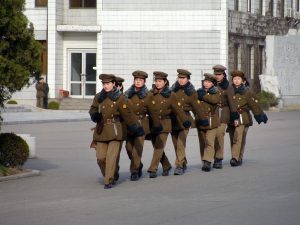Ever since the COVID-19 pandemic broke out last year, the lives of North Korean soldiers have become even more difficult than usual. Food shortages, work period extensions, deployment to construction sites, a rise in crime by military personnel – these are but some examples of how North Korea’s military has been fairing since the start of the pandemic.
With North Korea’s borders still largely closed due to the COVID-19 pandemic, the plight of North Korea’s entire population has taken a turn for the worst. Although some issues, such as food shortages, affect the majority of the population, North Korean soldiers have been facing particularly dire circumstances this year.
One of the main causes for discontent among soldiers these days are deployments to cooperative farms, disaster-stricken zones, or construction sites. The move to relocate military personnel came as a result of the decision made during the January Workers’ Party Congress to shorten the military service period from 13 years to eight years for men and from eight years to five years for women, while soldiers who had reached maturity were to be discharged as of 2020. Although a reduction in military service time may seem like a good thing, those who expected to be discharged soon suddenly found themselves being deployed to remote areas doing labor-intensive work.
For example, according to AsiaPress, in July a large number of discharged military personnel were sent to a cooperative farm in North Hamgyong Province to provide much-needed labor. But far from providing help to the community, they wreaked havoc by harassing women in the area and engaging in other violent behavior. Once a discharged soldier is sent to the countryside to work on a farm, it becomes increasingly difficult for them to climb up the social ladder and receive better job promotions or join the Workers’ Party.
But it is not just soldiers being dispatched to remote areas for manual labor. According to a recent Daily NK report, officers over the rank of major in Yanggang Province are also being deployed to build makeshift structures as part of efforts to prevent border crossings and defections along the Sino-North Korean border. According to a Daily NK source, the reason why officers of higher ranks are being chosen for work near the border is because authorities fear ordinary enlisted soldiers – whose food rations and overall living circumstances are far worse – may choose to defect if sent to such areas.
“While majors, lieutenant colonels and colonels have been mobilized for the work, they are so thin they look malnourished,” the source said. “The officers look so unwell, it goes without saying that the enlisted men must be even worse.”
Worse than being deployed to remote areas is the lack of food many in the military continue to experience. Due to the severe food shortages caused by the prolonged border closure with China as well as natural disasters, there is not enough to eat, even for military personnel. Although they do receive food from the military, the quality is poor and the quantity little. As a result, soldiers are going beyond robbing homes and are now even targeting government agency food storage facilities.
“Some soldiers are so weak from malnutrition due to lack of food that they are being put in military infirmaries when they try to escape [after being caught stealing], but are instead beaten to a pulp by civilians,” one source explained. According to the source, soldiers deployed to that area are surviving on barely a single meal made from arrowroot dug up from the hillsides.
The situation at the border is unlikely to improve any time soon, as work to complete high-voltage wires and walls has a long way to go. Many locals doubt the ability of the soldiers to complete the work by the October 10 – North Korea’s Party Foundation Day – deadline.
Besides food shortages, a lack of construction equipment and other necessary supplies is also making the work of the soldiers all the more difficult. According to one Daily NK source in Yanggang Province, authorities have provided only 40 percent of the supplies needed for the construction work in that area. To make matters worse, some logistics officers have been forced to sell some of the construction supplies in order to feed the soldiers. “Logistics officials who are tasked with feeding the troops have nothing, and they’re getting no help from either the localities or from Pyongyang. So they’re [selling] rebar, cement and sand and buying freshly harvested potatoes or corn to feed the soldiers,” one source explained.
Despite the dire situation faced by soldiers and military personnel in the country, their workload is unlikely to be reduced any time soon. With the borders still closed, food shortages will likely continue affecting both ordinary citizens and military personnel. Moreover, with the October 10 deadline fast approaching, even larger efforts to mobilize soldiers are likely to ensue.
Although many in the military are being deployed to border zones to prevent people from defecting, the conditions under which they are working and living only serve to further prove to ordinary people the deep failures of their government.
If those working in the military already face such dire circumstances, it is difficult to imagine how much worse the situation of the ordinary citizen must be.
Still, North Korea maintains that its COVID-19 “prevention measures” are not violating the human rights of its people, despite a U.N. report last week arguing the opposite. With North Korea continuing to reject foreign aid and doubling down on efforts to blockade the border, the North Korean people have a tough winter ahead of them.
This article first appeared on Daily NK, which contacts multiple sources inside and outside North Korea to verify information. The Diplomat was not able to verify the claims independently.

































